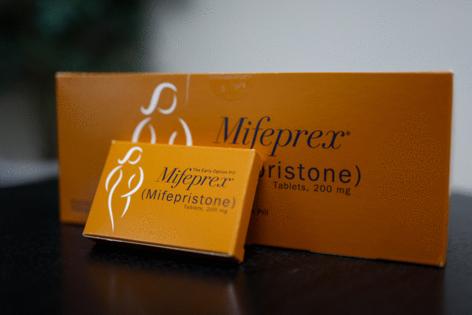The abortion pill fight isn't over. Foes look to 1873 obscenity law while providers vow to ensure access
Published in Political News
While the U.S. Supreme Court appears poised to keep a widely used abortion pill available for now, some conservative justices signaled an interest in considering whether a 151-year-old indecency law should prevent American women from receiving the drug by mail.
A majority of the court indicated during arguments Tuesday they weren’t convinced a group of conservative doctors had legal standing to oppose Food and Drug Administration approval of mailing doses of mifepristone, a drug now used in more than half of all abortions. But Justices Clarence Thomas and Samuel Alito asked about the reach of the Comstock Act, a law passed in 1873 that prohibits mailing of “lewd materials” and drugs used to terminate a pregnancy.
The prospect of a future challenge based on that law, which hasn’t been enforced for decades, is a concern for abortion advocates. They’ve faced a widening battle since the high court overturned the landmark Roe v. Wade decision in 2022, clearing the way for tougher restrictions or bans on the procedure in Republican-led states.
“Do we think the Supreme Court majority is going to rule on the Comstock Act in this case? The answer to that is no,” said Mary Ziegler, a law professor at the University of California at Davis who specializes in reproductive rights. “Do we think that the Comstock Act is going to come up again at some point in the future? The answer to that is definitely.”
The high court won’t rule for a few months on the case challenging the FDA’s approval of mifepristone, and it isn’t clear that any justices beyond Alito and Thomas are interested at this stage in applying the Comstock Act. But the doctors and a conservative legal group behind the case cited the law as one reason to roll back FDA’s 2021 decision that permitted the drug to be distributed to patients through the mail. And abortion opponents could revive the argument in a future case, particularly if Alito and Thomas signal they are receptive.
Abortion opponents have been trying for years to use the anti-obscenity measure as a means to restrict abortion, through city and state statutes and attempts at litigation. They’re also hopeful that, should former president Donald Trump be elected again in November, he could direct the Justice Department to start prosecuting abortion providers and drug manufacturers. Under the Biden administration, the DOJ said the law does not apply to abortion pills.
“If the Justice Department took a different position on the Comstock Act, that would obviously be a major game changer,” Ziegler said.
Abortion providers and advocates say preventing mail distribution of mifepristone will make the abortion pill harder to obtain and possibly more expensive, even in states where the procedure remains legal. They’ve warned that it could lead to fewer providers offering the drug and longer wait times at abortion clinics that have already been struggling to meet demand since the Supreme Court ended federal constitutional protections for abortion.
To be sure, ending all mail distribution of the drug may be difficult even if banned by Supreme Court ruling. Some providers say they are poised to start mailing a one-pill abortion method that uses only misoprostol, the second pill in the existing regimen. Misoprostol is effective at terminating a pregnancy on its own, but is known to cause more discomfort for patients than the two-pill combination.
And some distributors said they will continue to send mifepristone through the mail.
...continued
©2024 Bloomberg L.P. Visit bloomberg.com. Distributed by Tribune Content Agency, LLC.







Comments